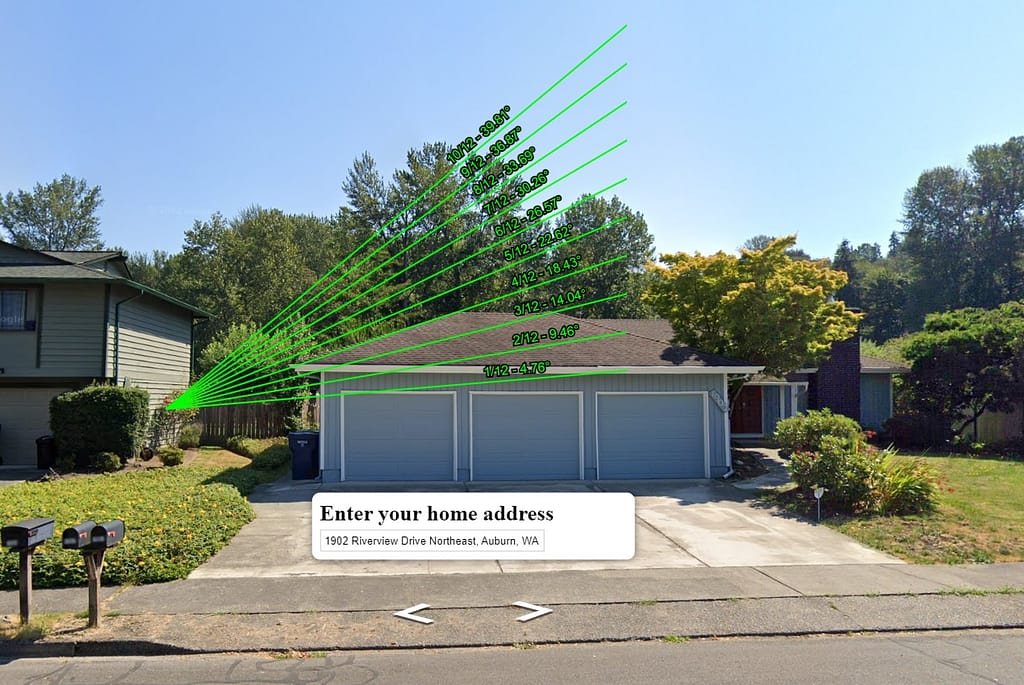Roofing Calculator for Instant Roof Replacement Cost
No appointments. No waiting. No spam. Up to three roof quotes based on your home and chosen materials.
Enter your address into our roofing calculator to get real roof measurements, accurate roof estimates, and verified contractor reviews in under thirty seconds. This free roof calculator requires no signup and no contact information.
The average roof replacement cost in the United States today is $15,520.
Roof estimator and roofing calculator powered by the largest contractor network in the United States, with over 45,000 contractors and 250,000 Google verified reviews.


788,110 Roofs measured by our roofing calculator in the United States

$15,520 Average roof replacement cost for Asphalt Shingle roofs in the United States

45,753 Highly rated roofers in the United States
Data refreshes daily. Learn how the data is calculated. Last updated:
Instant Roofer provides the most accurate online roof estimates by measuring your home and pairing you with trusted roofing contractors in your area. Use our roofing estimator to compare pricing, materials, and verified reviews without any calls or in person visits. It's the easiest way to get a new roof estimate and make an informed decision with confidence.
The average cost to replace a roof in the United States is about $15,520. This is based on the average roof size (with pitch) in the United States of 2,512 sqft (25.00 squares) and the area's most common material, Asphalt Shingle, which runs about $6.18 per sqft ($618/square).
Average Cost by Material
The cost to replace a roof can vary greatly depending on the type of roofing material used. The costs listed below are based on an average roof in the United States.
Roof Replacement Costs by Home Size
Home size is one of the biggest factors contributing to replacement costs. This table shows replacement costs for different home sizes for each roofing material in the United States.
| SQFT | SQUARES | COST |
|---|---|---|
| 500 | 5 | $3,089 |
| 1,000 | 10 | $6,178 |
| 1,500 | 15 | $9,268 |
| 2,000 | 20 | $12,357 |
| 2,500 | 25 | $15,446 |
| 3,000 | 30 | $18,535 |
| 3,500 | 35 | $21,624 |
| 4,000 | 40 | $24,713 |
| 4,500 | 45 | $27,803 |
| 5,000 | 50 | $30,892 |
| SQFT | SQUARES | COST |
|---|---|---|
| 500 | 5 | $7,156 |
| 1,000 | 10 | $14,312 |
| 1,500 | 15 | $21,467 |
| 2,000 | 20 | $28,623 |
| 2,500 | 25 | $35,779 |
| 3,000 | 30 | $42,935 |
| 3,500 | 35 | $50,091 |
| 4,000 | 40 | $57,246 |
| 4,500 | 45 | $64,402 |
| 5,000 | 50 | $71,558 |
| SQFT | SQUARES | COST |
|---|---|---|
| 500 | 5 | $6,995 |
| 1,000 | 10 | $13,990 |
| 1,500 | 15 | $20,985 |
| 2,000 | 20 | $27,980 |
| 2,500 | 25 | $34,975 |
| 3,000 | 30 | $41,970 |
| 3,500 | 35 | $48,965 |
| 4,000 | 40 | $55,960 |
| 4,500 | 45 | $62,955 |
| 5,000 | 50 | $69,950 |
| SQFT | SQUARES | COST |
|---|---|---|
| 500 | 5 | $4,831 |
| 1,000 | 10 | $9,662 |
| 1,500 | 15 | $14,492 |
| 2,000 | 20 | $19,323 |
| 2,500 | 25 | $24,154 |
| 3,000 | 30 | $28,985 |
| 3,500 | 35 | $33,815 |
| 4,000 | 40 | $38,646 |
| 4,500 | 45 | $43,477 |
| 5,000 | 50 | $48,308 |
| SQFT | SQUARES | COST |
|---|---|---|
| 500 | 5 | $6,365 |
| 1,000 | 10 | $12,729 |
| 1,500 | 15 | $19,094 |
| 2,000 | 20 | $25,458 |
| 2,500 | 25 | $31,823 |
| 3,000 | 30 | $38,188 |
| 3,500 | 35 | $44,552 |
| 4,000 | 40 | $50,917 |
| 4,500 | 45 | $57,282 |
| 5,000 | 50 | $63,646 |
| SQFT | SQUARES | COST |
|---|---|---|
| 500 | 5 | $4,933 |
| 1,000 | 10 | $9,866 |
| 1,500 | 15 | $14,799 |
| 2,000 | 20 | $19,732 |
| 2,500 | 25 | $24,665 |
| 3,000 | 30 | $29,598 |
| 3,500 | 35 | $34,530 |
| 4,000 | 40 | $39,463 |
| 4,500 | 45 | $44,396 |
| 5,000 | 50 | $49,329 |
How Roof Replacement Impacts Home Value
Homeowners frequently want to know how replacing their roof could impact the overall value of their home. This table shows how roof replacement, by material and home size, could impact home value in the United States.
| SQFT | VALUE ADDED |
|---|---|
| 500 | $1,854 |
| 1,000 | $3,707 |
| 1,500 | $5,561 |
| 2,000 | $7,414 |
| 2,500 | $9,268 |
| 3,000 | $11,121 |
| 3,500 | $12,975 |
| 4,000 | $14,828 |
| 4,500 | $16,682 |
| 5,000 | $18,535 |
| SQFT | VALUE ADDED |
|---|---|
| 500 | $4,437 |
| 1,000 | $8,873 |
| 1,500 | $13,310 |
| 2,000 | $17,746 |
| 2,500 | $22,183 |
| 3,000 | $26,620 |
| 3,500 | $31,056 |
| 4,000 | $35,493 |
| 4,500 | $39,929 |
| 5,000 | $44,366 |
| SQFT | VALUE ADDED |
|---|---|
| 500 | $4,127 |
| 1,000 | $8,254 |
| 1,500 | $12,381 |
| 2,000 | $16,508 |
| 2,500 | $20,635 |
| 3,000 | $24,762 |
| 3,500 | $28,889 |
| 4,000 | $33,016 |
| 4,500 | $37,143 |
| 5,000 | $41,270 |
| SQFT | VALUE ADDED |
|---|---|
| 500 | $2,802 |
| 1,000 | $5,604 |
| 1,500 | $8,406 |
| 2,000 | $11,207 |
| 2,500 | $14,009 |
| 3,000 | $16,811 |
| 3,500 | $19,613 |
| 4,000 | $22,415 |
| 4,500 | $25,217 |
| 5,000 | $28,018 |
| SQFT | VALUE ADDED |
|---|---|
| 500 | $3,628 |
| 1,000 | $7,256 |
| 1,500 | $10,884 |
| 2,000 | $14,511 |
| 2,500 | $18,139 |
| 3,000 | $21,767 |
| 3,500 | $25,395 |
| 4,000 | $29,023 |
| 4,500 | $32,651 |
| 5,000 | $36,278 |
| SQFT | VALUE ADDED |
|---|---|
| 500 | $2,466 |
| 1,000 | $4,933 |
| 1,500 | $7,399 |
| 2,000 | $9,866 |
| 2,500 | $12,332 |
| 3,000 | $14,799 |
| 3,500 | $17,265 |
| 4,000 | $19,732 |
| 4,500 | $22,198 |
| 5,000 | $24,665 |
United States Roof Statistics
| The number of roofs our tech has scanned | 788,110 |
| Average roof size (with pitch) | 2,512 Square Feet |
| Most common roof types | Asphalt Shingle, Metal, Clay Terra Cotta, Concrete, Cedar Shingle, Flat Roof |
Frequently Asked Roofing Questions in The United States
Homeowners
What is Instant Roofer and how does it work?
Instant Roofer provides homeowners with an instant roof estimate based
on contractor pricing and AI-powered roof measurements for the property
address entered. Homeowners simply enter their address, receive an
immediate estimate, and can choose to connect with trusted, highly rated
local roofing contractors. Is using the roofing estimator free?
Yes. Homeowners can use the Instant Roofer roofing calculator for free
with no signup required. The tool delivers roof measurements and cost
estimates instantly. How accurate are the roof measurements?
Our AI model analyzes roof geometry and material data to deliver precise
roof measurements with up to 98% accuracy. How often are cost estimates updated?
Contractors regularly update their pricing to reflect current material
costs, labor rates, and local market conditions, ensuring homeowners see
realistic and up-to-date roofing estimates. How are roofing quotes and follow-ups handled?
Contractors typically use estimates as the starting point for
follow-ups. Once you choose a contractor, they’ll provide a detailed
proposal and schedule a walkthrough or inspection before work begins. Contractors
How can contractors advertise on Instant Roofer?
Contractors can join the Instant Roofer network to receive leads,
display company profiles, and integrate Instant Roofer AI Tools on their
own websites. Select the ‘Contractor Sign-Up’ button on the top right of
the page to get started. What are 'price-conditioned leads'?
Instant Roofer offers a pricing model where contractors determine how
much they’re willing to pay per lead based on project type and material.
This transparent system balances quality with value and lets contractors
control their lead costs. What is the AI Sales Tool Bundle?
With Instant Roofer AI Sales Tools Subscription, contractors have full
access to Instant Measure Reports, Website Calculator Integration,
Contact Form Integration, and much more. What if I’m not getting as many leads as expected?
Lead volume can fluctuate based on competition in your area, online
reviews, and your plan level. Improving reviews or upgrading to a higher
tier can increase lead flow. Top Roofing Contractors in the United States
American Home Contractors
4.9
5673 reviews
11820 W Market Pl
Fulton, MD 20759
(301) 209-7000
Good Faith Energy
4.9
733 reviews
4122 Billy Mitchell Drive
Addison, TX 75001
(972) 777-6937
PITCH Roofing
4.8
142 reviews
7835 Seminole Boulevard
Seminole, FL 33772
(727) 677-4824
Green Attic Roofing
4.8
703 reviews
3940 Willow Street
Schiller Park, IL 60176
(847) 871-9999
Sustainable Living Builders, Inc.
4.9
85 reviews
4399 Gravenstein Highway South
Sebastopol, CA 95472
(707) 595-8500
Show 15 More
Central Florida Equity Builders
5
176 reviews
2582 Connection Point
Oviedo, FL 32765
(407) 276-5289
Roofing Formula LLC.
5
142 reviews
8205 Northeast 142nd Street
Kirkland, WA 98034
(425) 207-6016
Shield Roofing Systems
5
76 reviews
3419 Swensen Road
Pearland, TX 77581
(832) 686-7108
Power Northwest Inc
5
142 reviews
2711 Northwest Saint Helens Road
Portland, OR 97210
(503) 208-4357
Here4You Restoration
5
43 reviews
7115 New Town Road
Waxhaw, NC 28173
(304) 657-5373
Legacy Roofing
4.9
590 reviews
570 East 1700 South
Clearfield, UT 84015
(801) 837-8182
M-N-M Roofing Professionals
4.9
216 reviews
106 Pfeuffer Court
Greentown, PA 18426
(570) 793-5715
A&E Brothers Roofing
4.9
536 reviews
4391 Southwest 74th Avenue
Miami, FL 33155
(305) 815-7208
Nexus Development LLC
4.9
30 reviews
3846 West Wisconsin Avenue
Milwaukee, WI 53208
(414) 323-5018
Restoration Roofing & Remodeling LLC
4.9
67 reviews
6902 Farm to Market 2920
Spring, TX 77379
(832) 388-5393
Coastal Energy Inc
5
21 reviews
5660 Strand Court
Naples, FL 34110
(239) 299-8567
Golden top roofing
5
12 reviews
329 Goshawk Court
Patterson, CA 95363
(925) 875-8572
Midtown Roofing
5
19 reviews
5030 North May Avenue
Oklahoma City, OK 73112
(405) 450-3010
Clean Roofing
4.4
35 reviews
224 North 27th Street
San Jose, CA 95116
(888) 336-2115
All & One Construction
5
40 reviews
211 South Citrus Avenue
Covina, CA 91723
(626) 404-6636
Roof Costs in the USA
Alabama
- Avg Cost: $15,605
Alaska
- Avg Cost: $17,218
Arizona
- Avg Cost: $15,025
Arkansas
- Avg Cost: $14,199
California
- Avg Cost: $18,102
Colorado
- Avg Cost: $18,700
Connecticut
- Avg Cost: $15,450
Delaware
- Avg Cost: $18,198
Florida
- Avg Cost: $15,452
Georgia
- Avg Cost: $15,898
Hawaii
- Avg Cost: $20,731
Idaho
- Avg Cost: $15,473
Illinois
- Avg Cost: $12,707
Indiana
- Avg Cost: $16,741
Iowa
- Avg Cost: $11,255
Kansas
- Avg Cost: $14,706
Kentucky
- Avg Cost: $13,362
Louisiana
- Avg Cost: $14,782
Maine
- Avg Cost: $18,180
Maryland
- Avg Cost: $14,042
Massachusetts
- Avg Cost: $14,087
Michigan
- Avg Cost: $13,565
Minnesota
- Avg Cost: $16,016
Mississippi
- Avg Cost: $15,112
Missouri
- Avg Cost: $12,790
Montana
- Avg Cost: $16,315
Nebraska
- Avg Cost: $12,855
Nevada
- Avg Cost: $17,658
New Hampshire
- Avg Cost: $12,840
New Jersey
- Avg Cost: $11,529
New Mexico
- Avg Cost: $15,101
New York
- Avg Cost: $16,621
North Carolina
- Avg Cost: $14,141
North Dakota
- Avg Cost: $14,744
Ohio
- Avg Cost: $12,531
Oklahoma
- Avg Cost: $18,587
Oregon
- Avg Cost: $16,830
Pennsylvania
- Avg Cost: $12,487
Rhode Island
- Avg Cost: $12,179
South Carolina
- Avg Cost: $15,837
South Dakota
- Avg Cost: $20,476
Tennessee
- Avg Cost: $16,281
Texas
- Avg Cost: $17,366
Utah
- Avg Cost: $14,570
Vermont
- Avg Cost: $12,826
Virginia
- Avg Cost: $17,419
Washington
- Avg Cost: $15,047
West Virginia
- Avg Cost: $12,988
Wisconsin
- Avg Cost: $16,450
Wyoming
- Avg Cost: $22,432
Using Online Roofing Cost Calculators & Roofing Estimators
Our roof calculator makes it easy to get an accurate and instant roof quote. Our roof estimator tool uses AI to scan your roof and deliver results without requiring personal information, and you won't be contacted by anyone unless you choose to be. While many roof replacement cost calculators on the market focus on collecting your details for marketing, ours is designed to save you time and simplify the process without being intrusive.
Continue reading for a deeper look at new roof costs in the United States, but if you want quick numbers for your home right now, our free roofing calculator is the fastest way to start. Each type of roofing material has its own cost and durability. Since roof quotes are heavily dependent on the square footage of the structure being reroofed, knowing your roof's dimensions (with pitch) will help you budget more accurately.
Roof Replacement Cost by Material and Size
The table below breaks down the average cost to replace roofs by material and size.
| Roof Material | Average Lifespan |
|---|---|
| Asphalt Roof | 15 to 30 Years |
| Cedar Shake | 20 to 40 Years |
| Flat Roof | 15 to 25 Years |
| Metal Roof | 40 to 70 Years |
| Tesla Solar Roof | 30 to 40 Years |
Asphalt Shingles
The average cost to replace an asphalt shingle roof in the USA is typically between $3,089 to $30,892 with costs being directly tied to the size of your home, the type of Asphalt Shingle and labor costs in your area. Today, the cost of an Asphalt Shingle Roof is roughly $6.18/sqft ($618/square).
There are three main types of Asphalt Shingles:
- 3-tab shingles usually last 15 to 20 years
- Architectural shingles usually last 22 to 25 years
- Designer shingles usually last 25 to 30 years
Lifespan of these materials can vary greatly, depending on quality, installation techniques and climate.
Metal Roofs
The average cost to replace a metal roof in the USA is typically between $7,156 and $71,558, with costs being directly tied to the size of your home, metal type, and labor costs in your area. Today, the cost of a Metal Roof is roughly $14.31/sqft ($1,431/square).
There are three main types of metal roofing and they vary in price and durability:
- Corrugated metal roofs should last 30 to 45 years
- Standing seam metal roofs should last 40 to 70 years
- Premium metals such as copper or zinc should last 60 to 100 years
Metal roofs typically last 40 to 70 years, depending on metal type, installation method, and climate.
Clay Terra/Cotta
The average cost to replace a clay or terra cotta tile roof in the USA is typically between $6,995 and $69,950, with costs being directly tied to the size of your home, tile type, and labor costs in your area. Today, the cost of a Clay Terra/Cotta roof is roughly $13.99/sqft ($1,399/square).
There are three main types of clay and terra cotta tiles and they vary in price and durability:
- Standard clay tiles that last 40 to 60 years
- Terra cotta tiles that last 50 to 75 years
- Premium barrel or Spanish tiles that last 75 to 100 years
Clay and terra cotta roofs typically last 50 to 100 years, depending on tile quality, installation technique, and climate.
Concrete
The average cost to replace a concrete tile roof in the USA is typically between $4,831 and $48,308, with costs being directly tied to the size of your home, tile type, and labor costs in your area. Today, the cost of a Concrete tile roof is roughly $9.66/sqft ($966/square).
There are three main types of concrete roof tiles and they vary in price and durability:
- Standard concrete tiles typically last 30 to 40 years
- Textured or stamped concrete tiles typically last 35 to 50 years
- Premium heavyweight concrete tiles typically last 40 to 60 years
Concrete roofs typically last 30 to 50 years, depending on tile density, installation quality, and local climate.
Cedar Shake
The average cost to replace a cedar shake roof in the USA is typically between $6,365 to $63,646 with total costs depending on the type of shake and labor costs in your area. Today, the cost of a Cedar Shake Roof is roughly $12.73/sqft ($1,273/square).
There are three common types of cedar shakes:
- Hand split shakes usually last 20 to 30 years
- Taper sawn shakes usually last 25 to 35 years
- Heavy split and re-sawn shakes usually last 30 to 40 years
Lifespan of Cedar Shakes can vary greatly, depending on quality, installation techniques and climate.
Flat Roofs
The average cost to replace a residential flat roof in the USA is typically between $4,933 to $49,329, with costs being directly tied to the size of the structure and the materials used. Large flat commercial roofs can cost hundreds of thousands of dollars or run into the millions if the structure is large enough. Today, the cost of a Flat Roof is roughly $9.87/sqft ($987/square).
There are four main flat roofing materials and they vary in price and durability:
- EPDM rubber roofs usually last 15 to 20 years
- Modified bitumen roofs usually last 15 to 20 years
- Built up felt roofs usually last 15 to 20 years
- Fiberglass or GRP roofs last roughly 20 to 25 years
Flat roofs typically last 15 to 25 years, depending on material type, installation quality, and maintenance.
Labor Costs for Roof Replacement
Roofers typically charge between $40 and $90 per hour per worker, depending on location and job complexity. These labor costs will account for around 60% of the total cost of your new roof. These costs can also increase with complex roofs, steep pitches, or multi-level homes. Tear-offs, decking repairs, and ventilation upgrades can add labor hours. Licensed roofing contractors may charge more, but they also offer warranties and better quality assurance.
Roof Pitch Impact on Cost
Roof pitch impacts replacement cost because steeper slopes require more materials and labor. A higher pitch increases surface area, driving up material use and waste. It also demands extra safety gear, skilled labor, and time, all of which raise costs. with steeper roof pitches often cost significantly more to replace than those with flatter roofs. Because of this, calculating the pitch of your roof is very important.

Additional Replacement Costs
When replacing your roof, there are several other things beyond the materials and labor that contribute to a durable and code-compliant installation. Individually, these items do not cost much, but their combined cost can significantly impact your total project budget.
| Item | Average Cost Range |
|---|---|
| Nails & Fasteners | $100 - $300 |
| Underlayment | $500 - $1,000 |
| Ice & Water Barrier | $400 - $900 |
| Starter Shingles | $100 - $300 |
| Ventilation | $300 - $700 |
| Flashing | $200 - $600 |
| Drip Edge | $150 - $400 |
| Debris Removal & Disposal | $500 - $1,500 |
| Permits & Inspections | $500 - $2,000 |
| Repair or Replacement of Damaged Wood | $500 - $2,000 |
Regional Roof Replacement Costs
One of the biggest factors contributing to roof replacement costs is the location of your home. While roofing material prices are relatively consistent nationwide, labor rates, permitting requirements, and local building codes can vary dramatically between states and even between cities.
Local Building Codes:
Some states have stricter
codes due to weather risks like hurricanes, snow loads, or wildfires.
Meeting these standards often requires additional materials,
reinforcements, or inspections.
Material Accessibility:
Regions that are farther
from distribution hubs or manufacturing centers may see higher prices due
to transportation costs and limited supply chains.
Hidden and Unforeseen Costs
Even with a detailed new roof estimate in hand, unexpected issues can still arise once your old roof is removed. These hidden or unforeseen costs can significantly impact your total budget, especially if your home has underlying damage that wasn't visible during the initial inspection.
| Item | Estimate Cost Range | Description |
|---|---|---|
| Rotting Deck | $1,000 - $2,500 | Replacing damaged or weakened wood sheathing |
| Mold Remediation | $500 - $5,000+ | Cleaning up mold caused by leaks or poor ventilation |
| Pest Damage Repairs | $300 - $2,000 | Repairs due to rodents, termites, or insect damage |
| Code Upgrades | $500 - $3,000+ | Upgrades to meet current building codes |
Roof Warranty Coverage
When replacing your roof, it's important to understand what kind of warranty coverage you're getting. Having the right warranty can protect you from unexpected costs due to material defects or installation errors.
A reliable roof warranty should include both material and workmanship coverage. Homeowners need to understand what the manufacturer warranty covers, how it changes over time, and what protection the contractor's workmanship warranty offers.
Manufacturer Warranties
This type of warranty is provided by the company that makes the roofing materials, such as asphalt shingles or underlayment. A manufacturer warranty typically covers defects in the roofing materials, meaning if your shingles crack, blister, or fail prematurely because of a manufacturing issue, the manufacturer will supply replacement materials. These warranties often do not cover labor, tear-off, or disposal costs unless you choose an upgraded or extended version.
Manufacturer warranties are often marketed as “lifetime,” but they usually offer full coverage for a limited time (such as 10 or 15 years). After that initial period, the coverage becomes prorated, meaning the compensation you receive decreases as your roof gets older.
Workmanship Warranties
Offered by the roofing contractor, a workmanship warranty covers errors made during the installation process. Even high-quality shingles can fail if they're not installed properly, which is why this warranty is so important. If a roof leak or structural issue is traced back to poor installation, a workmanship warranty ensures the contractor is responsible for repairs instead of the homeowner.
Coverage length varies by contractor and can range from a few years to 10, 15, or even lifetime coverage, depending on the company. Some roofing contractors may only offer limited warranties, while others provide more comprehensive, long-term guarantees.
Financing Your Roof Replacement
With costs ranging from several thousand to tens of thousands for replacing your roof, financing can help make it more manageable. Here are some of the most common roof financing options and factors that may affect your financing eligibility.
Common Roof Financing Options
Depending on your financial situation and credit profile, here are some of the most popular ways to finance a roof replacement:
| Financing Option | Typical Term Length | APR Range | Notes |
|---|---|---|---|
| Home Equity Loan | 5 - 30 Years | 5.0% - 8.5% | Fixed rate, good for larger projects; requires sufficient home equity. |
| HELOC (Home Equity Line) | 5 - 20 Years (10 - Year draw) | 6.0% - 10.5% (Variable rate) | Flexible access to funds; rates fluctuate. |
| Personal Loan | 1 - 10 Years | 6.5% - 20% | Quick approval, no collateral, high rates. |
| Roofing Company Financing | 1 - 15 Years | 0% - 15% | May offer promo rates like 0% APR for 6-24 months. |
| Credit Card | Revolving | 0% - 29.99% | Ideal for short-term use with promo rates; high APR if unpaid. |
Factors That Affect Your Financial Eligibility
Several factors play a role in determining whether you qualify for financing and what terms you'll receive:
Credit Score
Most lenders require a score of 640 or higher for competitive rates. The better your credit, the more financing options you'll have. Having a credit score of 700 or higher typically results in better terms and interest rates.
Loan-to-Value Ratio
A lower LTV (meaning you owe less relative to your home's value) improves your chances of approval and better interest rates. A good LTV ratio for roof replacement is typically 80% or lower.
Regional vs National Programs
Some states offer incentives, rebates, or grants for energy-efficient roofing projects, especially if you're installing reflective shingles or integrating solar panels. Be sure to check local programs that may reduce your out-of-pocket cost. According to the IRS, making qualified energy-efficient improvements to your home can net you up to $3,200 in tax credit per year.
How to Save on Replacement Costs
Here are some ways to reduce your roof replacement expenses without reducing the quality of your new roof.
Request Quotes From Multiple Roofers
Don't settle for the first roof quote you receive! To find a roofer, reach out to multiple reputable roofing contractors in your area. Obtaining multiple quotes allows you to compare pricing, workmanship guarantees, and materials used.
Schedule Around Peak Seasons
Roofing contractors are typically busier during peak seasons, such as late spring and early summer. Consider scheduling your roof replacement during the off-peak seasons (late fall or winter, depending on your climate). Contractors may be more willing to negotiate on labor costs during these times.
Choose a Lower Cost Roof Material
While you want a roof that's both durable and visually appealing, there are cost-effective roofing materials available. Asphalt shingles, for instance, provide a balance between affordability and performance.
Research the pros and cons of different materials to make an informed choice that suits your budget. Take into account any agreements like HOA rules about type and color of roofing material so you don't accidentally end up paying twice trying to save a buck!
Consider a Roof-Over
If your local building codes allow it and your existing roof is in reasonably good condition, you can save on labor and disposal costs by opting for a roof-over. This approach involves installing a new layer of roofing over the old one. However, it's essential to consult a professional to ensure this is a viable option, as it may not be suitable for roofs with extensive damage or structural issues.
Roof Financing Options
Explore financing options for your roof replacement and use a roof financing calculator. Many roofing companies offer financing plans with low-interest rates, allowing you to spread your roof replacement costs over a longer period. Additionally, check if there are any roofing grants or subsidies available in your area.
Energy-Efficient Roofing
Consider investing in energy-efficient roofing materials. While these materials may have a higher upfront cost, they can significantly reduce your long-term energy bills by providing better insulation and heat reflection. Over time, the energy savings can offset the initial investment, making it a cost-effective choice.
The ROI of Roof Replacement
Replacing your roof can significantly increase your home's value, especially if you're planning to sell in the near future. A new asphalt shingle roof can often recoup a large portion of its cost through added resale value. While asphalt shingles are the most common choice, premium materials such as metal, tile, or architectural shingles can offer even higher returns. These materials often come with extended warranties and improved durability, which can raise your home's perceived and appraised value. In many cases, a premium roof can boost resale value by $15,000 to $30,000, depending on the material and region.
Roof Replacement Cost Calculator Free Roof Estimate by Address
A modern roof replacement cost calculator makes it easy to understand how much to replace a roof without scheduling inspections or waiting days for callbacks. Using a powerful roof size calculator by address, our roofing cost calculator scans your home, performs a free roof measurement, and generates an instant roof estimate based on real material and labor data. This roof cost estimator functions as a full roofing estimator, giving homeowners a clear view of new roof cost in seconds through a simple online roof estimate.
Our roof cost calculator also works as a roof estimate calculator and roof replacement calculator, delivering an instant roof quote and online roof quote with no signup required. You can receive a free roof estimate, a free roof quote, and even use our free roofing calculator to explore pricing scenarios. To get started, try our roof replacement calculator at the top of this page and see an accurate online roof estimate in seconds, completely private and obligation free.
